AFP, September 12, 2017 – Millions of Florida residents were without power Tuesday as the remnants of Hurricane Irma spun northwest into the southeastern US, drenching the region and causing rivers to overflow.
Most of the Sunshine State appeared to have dodged forecasts of catastrophic damage despite dire early warnings.
But Irma’s overall death toll jumped to at least 40 after Cuba reported that 10 people had been killed there over the weekend.
Irma roared ashore as a powerful Category 4 hurricane when it hit the far southern Florida Keys on Sunday, tearing boats from their moorings, uprooting palm trees and downing power lines, after devastating a string of Caribbean islands.
By the time it hit the US mainland the storm had been downgraded, and by late Monday it had weakened further to a tropical depression.
Across the Caribbean, hard-hit island residents struggled to get back on their feet as Britain, France, the Netherlands and the United States increased relief efforts.
French President Emmanuel Macron traveled to the region Tuesday to tour devastated French territories, joining the Dutch king who had arrived in his country’s Caribbean territories on Sunday.
In Florida, the damage in most cases were not as bad as feared.
“If this had been a Category 4 hurricane the whole scenario would have been completely different,” said Bob Lutz, a 62-year-old business owner.
About 15 million people in Florida were without power, however, and Governor Rick Scott said the island chain known as the Keys had suffered widespread damage.
“It’s horrible what we saw,” Scott said after flying over the island chain aboard a Coast Guard helicopter.
He said the water, electricity and sewage systems in the Keys were non-operational, and that trailer parks had been “overturned.”
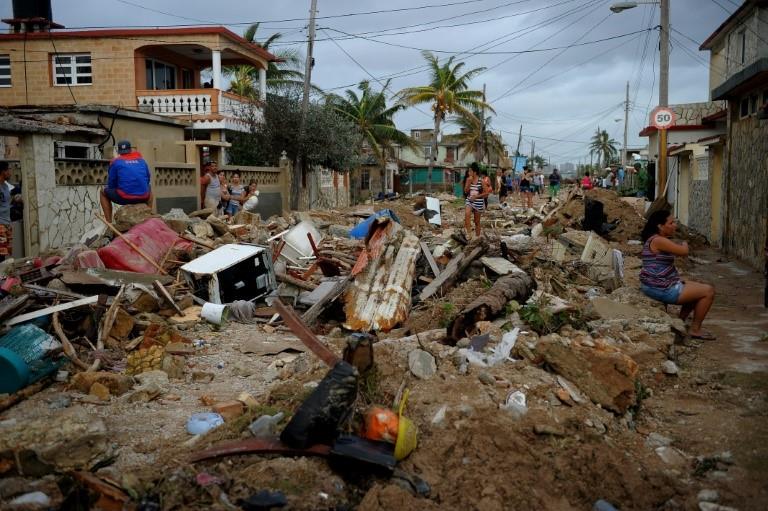
Residents sit on rubble in the Cojimar neighborhood of Havana following Hurricane Irma
“We now go through the much longer phase, which is the recovery phase,” said Miami Mayor Carlos Gimenez. “And believe me, folks, some of this is going to take a while, especially power restoration.”
Most Keys residents evacuated from the low-lying tourist archipelago, known for its fishing, scuba diving and boating, before Irma struck.
The storm felled trees and left debris and vehicles strewn across the streets. But concrete homes appeared to have withstood the powerful gusts.
Authorities were allowing residents and business owners in the upper part of the Keys to begin returning on Tuesday.
“Returning residents should consider that there are limited services. Most areas are still without power and water. Cell service is spotty. And most gas stations are still closed,” Monroe County authorities said in a Facebook post.
– Irma now a tropical depression –
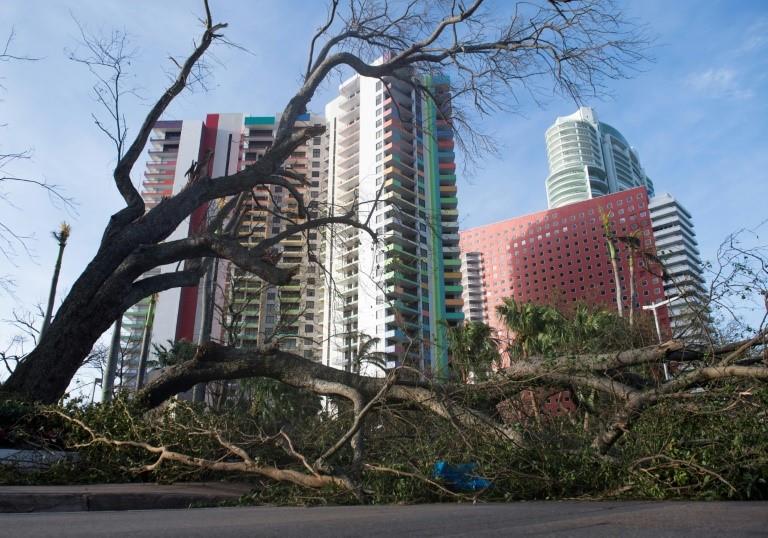
A fallen tree toppled by Hurricane Irma blocks a street in downtown Miami
The National Hurricane Center downgraded Irma to a tropical depression in its 0300 GMT Tuesday bulletin.
Irma’s maximum sustained winds dropped to 35 miles (56 kilometers) per hour, and the storm’s eye was in western Georgia, and expected to cross into eastern Alabama and Tennessee later Tuesday.
“Additional weakening is forecast, and Irma is… likely to dissipate by Wednesday evening,” the NHC said.
Heavy rain, however, was a problem: Florida’s northeastern city of Jacksonville, population 880,000, ordered urgent evacuations amid record flooding along the St Johns River.
Flooding was also reported in Charleston, South Carolina.
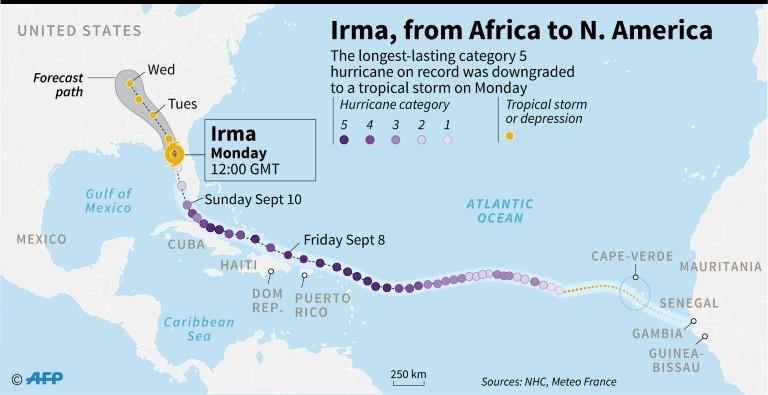
Irma’s path from Africa to North America
Irma had triggered orders for more than six million people to flee to safety, one of the biggest evacuations in US history.
In flood-prone Miami, the largest US city in Irma’s path, crews were busy clearing branches, debris and fallen street signs from downtown.
– 10 dead in Cuba –
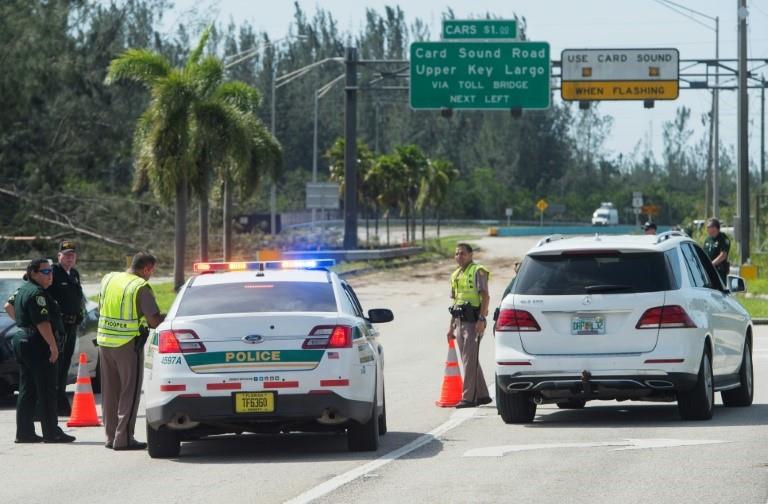
A police checkpoint on US Highway 1 blocks access to the Florida Keys following Hurricane Irma
In Bonita Springs, a city of 50,000 people on Florida’s hard-hit southwest coast, large areas were flooded and the entire city was without power. Some residents were trying to reach their homes by walking through waist-high floodwater, while others paddled canoes.
“I don’t think I can make it over to the house. I’d like to walk through there, but it looks like it’s three feet (one meter) deep at least, and my boots are only a foot deep and I don’t like cold water, which explains why I live here,” local resident Sam Parish told AFP.
Authorities across the state warned of downed power lines, raw sewage in floodwaters and — being Florida — displaced wildlife like snakes and alligators.
“Don’t think just because this has passed you can run home,” Governor Scott said. “We have downed power lines all across the state.
“We have roads that are impassable,” he said. “We have debris all over the state.”
President Donald Trump has approved the state’s request for emergency federal aid to help with temporary housing, home repairs, emergency work and hazard mitigation. He has promised to travel to the state “very soon.”
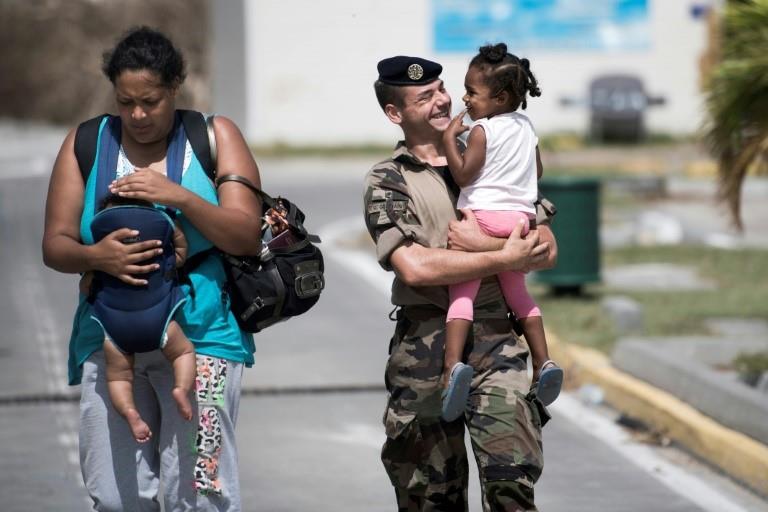
A family is escorted by a French soldier at the Grand-Case Esperance airport on the French Caribbean island of Saint-Martin
Before reaching the United States Irma tore through a string of Caribbean islands, going from tiny Barbuda on Wednesday to the tropical paradises of Saint Barthelemy and Saint Martin, the US Virgin Islands, Puerto Rico, the Dominican Republic, Haiti and the Turks and Caicos Islands.
Panama said it was distributing at least 90 tonnes of humanitarian aid to Saint Martin and Cuba, while Venezuela — itself beset by shortages amid a crippling economic crisis — sent 30 tonnes of food, drinking water and supplies to Cuba and other Caribbean islands.
About 400 exhausted and traumatized hurricane survivors landed in France and the Netherlands on Monday aboard military planes.
Both the French and Dutch governments have been criticized for delaying their emergency response, and especially over the handling of looting on Saint Barthelemy and Saint Martin, the latter an island with both French and Dutch sectors.
Cuban officials said Irma was the deadliest hurricane to strike the island since Dennis in 2005, adding that three-quarters of the population was without power.
“This is a big warning already, when you know that climate change is getting more and more cruel,” said Francisco Garcia, coach of Cuba’s national karate team, whose home was damaged by Irma.








